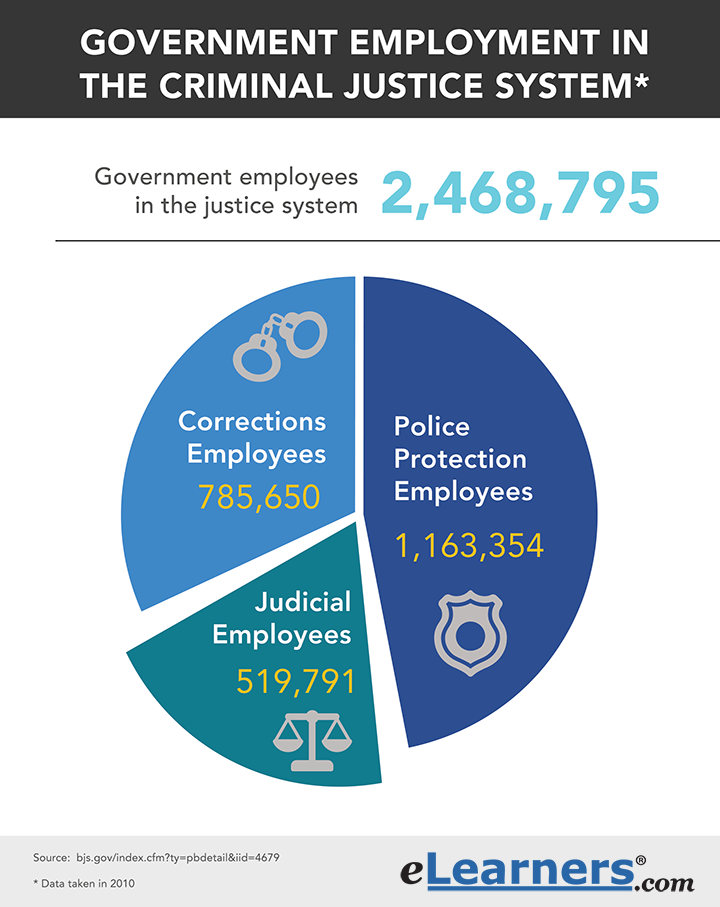There are many options when it comes to earning a Criminal Justice Degree. Maintaining security, upholding the law, and investigating criminal acts require specialized expertise.

Online criminal justice degrees may help you land a job in one of these criminal justice careers. Because there are many branches of the justice and law enforcement sectors, the salary and growth projection in this list of criminal justice jobs broadly range from a prisoner-guarding corrections officer to a bar-passing lawyer.
Police Officers and Detectives
You probably have a certain level of familiarity with the role police officers play in society they’re responsible for protecting the publi and enforcing the law.[i] The are the at the top of most's criminal justice careers list. Detectives investigate crimes with the help of others in the criminal justice field. While some police departments may require recruits to have an associate’s degree as a minimum educational requirement, the ability to become a police officer or detective is contingent on many regulations that are best researched at your local and state level.
Median annual salary: $56,980
Job projection: 5% through 2022
Private Detectives and Investigators
Working outside of government and state agencies, detectives and investigators make inquiries into legal, financial, and personal matters and often have a high school diploma equivalent and several years of experience working in law enforcement.[ii] These positions sometimes require additional licensure.
Median annual salary: $45,740
Job projection: 11% through 2022
Paralegals and Legal Assistants
Paralegals and legal assistants provide administrative support to lawyers and judges, including researching laws, drafting documents, and organizing files[iii]. In some organizations or law firms, a certification in legal studies is needed in addition to an earned associate’s or bachelor’s degree. This is a popular profession and make up a large part of people looking at a criminal justice careers list.
Median annual salary: $46,990
Job projection: 17% through 2022
Lawyers
Lawyers, sometimes referred to as attorneys, have completed their doctoral or professional degree in law school and often take state written bar exams in order to be able to practice law as a profession.[iv]
Lawyers are employed at both private corporations and at government and state agencies and deal with the legal/court aspect of criminal justice.
Median annual salary: $113,530
Job projection: 10% through 2022
Correctional Officer
Correctional officers supervise individuals who are awaiting trial or are serving jail time[v]. These officers often work odd hours since prisoners require 24 hour-per-day supervision. At a minimum, correctional officers are required to have a high school diploma or GED. Many states require them to have an associate’s degree, and the Federal Bureau of Prisons mandates that they must hold a bachelor’s degree to work in a federal correctional facility.
Median annual salary: $38,970
Job projection: 5% through 2022
Probation Officers and Correctional Behavioral Specialists
Probation officers and correctional behavioral specialists work with convicted offenders to prevent them from committing new criminal offenses.[vi] These officers and specialists usually hold a bachelor’s degree and are either recommended or required to complete fieldwork to gain experience.
Median annual salary: $48,190
Job projection: ~1% through 2022
Forensic Science Technician
The role of a forensic science technician is to collect and analyze physical evidence from a crime in the hopes of making a scientific conclusion that law enforcement can use to make a conviction.[vii] Criminal justice degree students who are interested in becoming a forensic science technician should have a strong background in biology or chemistry. Becuase of TV shows like "CSI" they have become a popular addition to our criminal justice careers list.
Median annual salary: $52,840
Job projection: 6% through 2022

Criminal Justice Internships ~ After You Earn Criminal Justice Degree
For a student choosing a career path, an internship usually gives you a heap of on-the-job training and first-hand experience in a professional climate that you just can’t learn in a classroom. Maybe you’re interested in a criminal justice internship, but are you having trouble deciding which area of criminal justice you’re interested in?
First, read “What is Criminal Justice?” to learn about the different branches. There are several internship opportunities dispersed among the many government agencies that are involved in criminal justice. You can even explore internships in government agencies that make up the Department of Homeland Security —such as FEMA, the U.S. Immigration and Customs Enforcement agency, and Federal Law Enforcement Training Centers. As with the government jobs listed above, you are required to be a U.S. citizen to participate in most criminal justice internships offered by government agencies.
As part of President Obama’s effort to bring more Americans into the federal job force, the Pathways Programs was created to serve as a resource to students and recent graduates who are looking for internship and entry-level job opportunities. There you can delve into listings for internships in government agencies and enquire about the application processes.
[i] bls.gov/ooh/protective-service/police-and-detectives.htm [ii] bls.gov/ooh/protective-service/private-detectives-and-investigators.htm [iii] bls.gov/ooh/legal/paralegals-and-legal-assistants.htm [iv] bls.gov/ooh/legal/lawyers.htm [v] bls.gov/ooh/protective-service/correctional-officers.htm [vi] bls.gov/ooh/community-and-social-service/probation-officers-and-correctional-treatment-specialists.htm [vii] bls.gov/ooh/life-physical-and-social-science/forensic-science-technicians.htm
